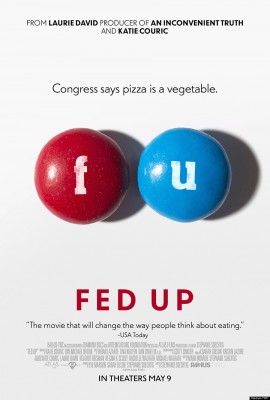Film Reviews

Fed Up
Genre: Documentary
Director: Stephanie Soechtig
Cast: Michele Simon
MPAA-Rating: PG
Release Date: May 9th, 2014
Before the early 1950s, and
exercise was often seen as a negative thing. Because of the health risks associated with it (it could cause heart attacks, said some), many didn’t support it.
That may be a shocking fact but it still stands as one of the least innocuous ones espoused in the new food documentary Fed Up. The new film, narrated by Katie Couric, seeks to reveal the reasons why— in this age of fitness clubs, healthy options and an overload of nutritional information— obesity remains such a major problem in the United States today.
The feature opens with Couric, who has reported on this issue for decades asking one underlying question: “What if our whole approach to this epidemic has been dead wrong?” The question hints at the idea that diet and exercise— two obvious paths to leaner bodies— may not be enough to undercut the obesity epidemic that seems to be growing (pardon the pun) every year, despite all of the factors that should be slowing it down.
Director Stephanie Soechtig, working alongside producer Laurie David (An Inconvenient Truth) attempts to uncover the truth about this dichotomy and explores some of the concepts that have been blatantly undermining the war on weight. Featuring interviews with health officials, professors and even former President Bill Clinton, the eye-opening film tries to show how desperate the situation has become. “I don’t think we appreciated the magnitude of it,” Clinton notes and with shocking facts– the realization that zero adolescents reported having Type 2 diabetes in 1980 and in 2010, over 50,000 young people had it– on display here, he’s right.
The blame here is scattered across a variety of public and private enterprises. For one, some public health studies are reportedly being skewed by the food companies that are funding them (in one case, twenty doctors resigned from their positions rather than sign onto a report funded by the Coca-Cola company). Additionally, the federal government itself— which, in many ways, has sought to warn the public about the obesity crisis— is shockingly subsidizing the food industry. With federal subsidies supporting the growth of certain products, the government is only allowing the problem to worsen. In fact, many public schools are now relying upon fast food restaurants to feed their students in school lunch programs.
To its credit, the film broadly discusses the subject and the factors causing the obesity epidemic but to its discredit, it often negates the role that individuals have in the process. Sure, the food industry is offering us unhealthy products and loading them with unknown sugars but individuals should recognize that and search for some alternatives of their own if they are concerned about this crisis. In fact, one of the young people battling obesity and prominently featured here turns around his diet by the end of the film and begins to lose a lot of weight— not because the food industry dramatically changed but because he and his personal habits changed (although, admittedly, he does eventually gain the weight back).
That being said, Fed Up still offers up powerful and surprising statistics that underline its core message. It’s a film that could change the way that you look at the food industry and the government itself. For too long, they argue, public health advocates have neglected some of their responsibilities and that, as they suggest, is certainly worth getting fed up about.
Review by: John Hanlon









